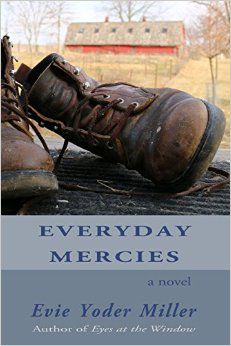 Everyday Mercies by Evie Yoder Miller
Everyday Mercies by Evie Yoder Miller
Review: Everyday Mercies
Evie Yoder Miller, Everyday Mercies. CreateSpace Independent Publishing, 2014.
When she’s far away in southern Ohio, she regards her family with such warmth. Not that they’re tight – she’d never go that far – but things sure feel better when she’s away than when she comes home….Funny – she knew, or thought she knew, she’d feel this way. Adrift. From the minute she stepped onto the dairy farm – the James and Charlotte Lehman homestead with the black-and-white spotted sign out front – she knew she’d not feel at home.
In Everyday Mercies, a novel by Evie Yoder Miller, a young woman, Carrie, returns to her parents’ dairy farm in Wisconsin for the Thanksgiving holiday with the intention to transform her life and the lives of her parents by moving home to grow organic vegetables on a piece of the family farm. Instead of finding an easy and hospitable environment in which to pitch her dream, she encounters old and new family dynamics that make her question her resolve.
When we meet the Lehmans, we find them coping with the sudden loss of a grandfather, trying to understand the economic effects of a farm tragedy, adjusting to Grandma living in the same house, trying to find balance when Carrie returns home, and experiencing the normal stresses of a big family gathering. The novel slowly unravels these difficulties as the Thanksgiving weekend progresses. The plot and movement of Everyday Mercies exist more in the subtlety of interactions between the characters than in fast-paced action.
Over the course of this Thanksgiving weekend, much is revealed about the inner lives of the Lehman family through intimate conversations as well as the musings of four generations of women. Yoder Miller allows us to hear the inner dialogue of Carrie, her mother, Charlotte, and her grandmother, Martha, as they are experiencing the same events. Through this technique, we begin to know them and to understand the complexities of motivation behind their actions and words. In addition to these present-day characters, we also learn to know Carrie’s great-grandmother through her daily journal entries.
Carrie’s family comes from an Old Order Mennonite background. Her mother and father left the Mennonite church when they were young, in part because they felt too restricted in the way they would have to raise their children. The older female characters question some of the practices of a church setting that created shame and left them in a system that gave them little sense of control over the events in their lives. These experiences led to depression, acceptance of place, or rebellion, depending on the generation. For Carrie, though the effects of a patriarchal system are more subtle, as she reminisces about her affinity for farm work in her youth, she remembers clearly the age when she was told not to get herself dirty anymore and was encouraged to pursue more feminine interests.
In this novel, the insularity of rural life and a religion that sometimes sets one apart are examined through the use of the singular setting of the farmstead as well as in the vernacular that surrounds it. This language is second nature to the characters, but receives little clarification for the outsider. Corn crib, milk parlor, plain coat, Harvestore silo, moldboard, chisel, calico blocks, the lowly, kept to the strings,
distiller’s grain, a stranger and a pilgrim,
Sayeth. This is a world of tradition, of separateness, a world that views change through a shrewd and cautious lens. Carrie’s proposal for change is met not just with her parents’ apprehension, but also with the weight of a cultural bias against her.
Regardless of this somewhat separate world, I found myself relating to each of the main characters – the brooding, passionate young woman looking for her self and her place in this world; the controlling, perfectionist mother who wants her house and her children to be an expression of her deepest desires for them; the tired, loving grandma who is dealing with profound loss and trying to find a way to still be relevant in an aging body. Each of these women encompasses the desires of the generation to which they belong and their (sometimes strained) interactions speak to the difficulties of finding common ground.
Yoder Miller doesn’t shy away from dysfunction in the Lehman family, but gives us rich subtext in which to understand it. And buds of common ground, of mercy, are also abundant under the surface. We witness a family that could be our own, for better or worse. We see their truths and understand their struggles.
Everyday Mercies is a novel that will be appreciated especially by those who have experienced a similar progression from a more closed, separate group to a more worldly, modern life, but it is also accessible to any of us who has felt lost, mourned a loved one, obsessed about perception, or searched for our place in this world. Additionally, this novel is an ode to rural life, which can be rich in its possibilities for both economic and spiritual pursuits.